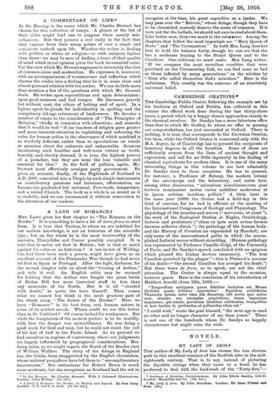A COMMENTARY ON LIFE.*
In the Evening is the name which Mr. Charles Stewart has chosen for this collection of essays. A glance at the list of their titles might lead one to suppose them merely mis- cellaneous. But they possess a real unity in the fact that they express from their many points of view a single and consistent outlook upon life. Whether the writer is dealing with politics or ethics or religion—or with subjects lighter than these—we may be sure of finding a trace of that quality of mind which in our opinion gives the book its essential value. For the view which Mr. Stewart expresses is invariably the view of common-sense and moderation. He expresses it, moreover, with an accompaniment of reminiscence and reflection which charms the reader into a feeling that he is in some close and almost personal relation with the author. We can do little more than mention a few of the questions with which Mr. Stewart deals. He writes upon superstitions and upon determinism ; upon good manners and bad temper. He discusses, gravely but without cant, the ethics of betting and of sport. In a lighter spirit he pleads for individuality in spelling and the compulsory old-age retirement of landowners. He devotes a number of essays to the consideration of "The Principles of Religion," chiefly in connexion with education; and remarks that it would be well " if our teachers of religion gave greater and more insistent attention to explaining and enforcing the rules for human action in the observance of which mankind is so woefully deficient, rather than to speculations on creeds or surmises about the unknown and unknowable. Sermons inculcating such familiar and well-worn virtues as truth, honesty, and charity demand, it is true, the highest powers of a preacher, but they are none the less valuable and essential for that." In the field of politics, again, Mr. Stewart most effectively arraigns party government. He gives an account, finally, of the Highlands of Scotland in A.D. 2000, converted into a Utopia by such simple instruments as contributory pensions and insurance, afforestation, an Income-tax graduated but universal, Free-trade, temperance, and a united Church. The book as a whole is as sound as it is readable, and we can recommend it without reservation to the attention of our readers.














































 Previous page
Previous page